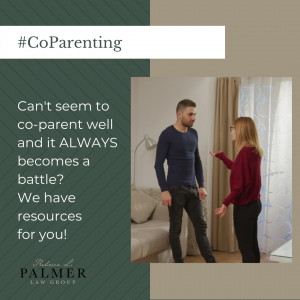 Co-parenting with an ex is a challenge, especially when the other parent is being obstinate or combative. Thankfully, there are co-parenting help and resources available aimed at achieving better conflict resolution. These include retaining a Parent Coordinator, Family Counselor, or Guardian Ad Litem to help accomplish a cooperative parenting plan.
Co-parenting with an ex is a challenge, especially when the other parent is being obstinate or combative. Thankfully, there are co-parenting help and resources available aimed at achieving better conflict resolution. These include retaining a Parent Coordinator, Family Counselor, or Guardian Ad Litem to help accomplish a cooperative parenting plan.
What is a Parenting Coordinator?
A parenting coordinator is an impartial third person selected either by the parents themselves or appointed by the court to help families create or follow a parenting plan by assisting them in resolving parenting issues or disputes. A parenting coordinator may be involved during a pending court case or afterward. Having a parenting coordinator is beneficial when parents are unable to communicate preferences in an emotionally charged situation. Therefore, when parents can’t agree, the parenting coordinator helps the parents resolve disputes by providing education, making recommendations, and making limited decisions. The parenting coordinator may make recommendations for the parents to utilize additional intervention resources that could benefit the child, such as counseling, psychologists, speech therapists, and learning disability aid, among others. Typically, the parenting coordinator is involved for a period of time, such as a year, during which multiple sessions occur.
What is a Mediator?
A mediator is an impartial third party who helps facilitate discussions during a mediation. The parents may use a mediator whether or not there is a pending court case. A mediator will work with parents to help create a parenting plan and will assist with negotiations/discussions in an attempt to help both parents reach an agreement. The mediator may provide the parents with suggestions on resolving specific issues but do not make any decisions. Typically, mediation is one session but can vary on the number of sessions and hours, depending on the number of issues to be resolved.
What is a Guardian Ad Litem?
A Guardian Ad Litem (“GAL”) may be appointed by the court in a pending court case to investigate and evaluate the child’s best interests and report findings and recommendations to the court. The GAL will conduct interviews with each parent and child and may also interview other individuals involved in a child’s life. These individuals could be other family members, friends, neighbors, teachers, coaches, or counselors who personally interact with the child. The GAL will typically visit each parent’s home to observe the living environment. The GAL may review documents such as communications between the parents, communications between each parent and child, medical records, school records. After completing the investigation and evaluation, the GAL will provide the court with a report and make recommendations on any relevant issues such as visitation, counseling, academics, and extracurricular activities. The court can place substantial weight on this recommendation.
If you see one of these resources that could potentially help you in a situation you’re in with co-parenting, please reach out to us at 407-757-2883. OR if you’d like to reach out via email to set up a consultation, please fill out the form below.



